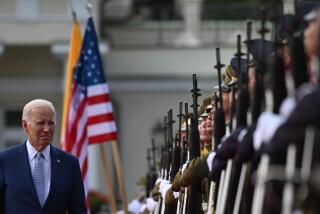Bush Softens Criticism of Baltics Crackdown : Diplomacy: But next month’s summit with Gorbachev remains up in the air. Soviet Union’s new foreign minister arrives for a visit today.
- Share via
WASHINGTON — On the eve of a visit here by the new Soviet foreign minister, President Bush Friday tempered his past criticism of the Soviet crackdown in the Baltic republics, but said that it remains to be determined whether he will visit Mocow next month as scheduled.
With Soviet Foreign Minister Alexander A. Bessmertnykh and Secretary of State James A. Baker III meeting today and Bush planning to meet with Bessmertnykh at the White House Monday, three issues have cast doubt on the planned Feb. 11-13 meeting with Soviet President Mikhail S. Gorbachev.
The issues are the situation in the Baltic republics of Latvia, Lithuania and Estonia; progress on remaining differences over a Strategic Arms Reduction Treaty, and the Persian Gulf War.
Bush has been described by senior aides as “outraged” over Moscow’s violent crackdowns in the Baltics. Recent confrontations in Lithuania and Latvia between partisans of independence and Soviet “black beret” troops have resulted in more than a dozen deaths. State Department spokeswoman Margaret Tutwiler said that the Baltics would be the first topic on the agenda today.
On Friday, speaking with reporters at a brief White House news conference, Bush offered only a mild rebuke to Moscow on the crisis, expressing understanding for the problems faced by Gorbachev and appreciation for his support on the Persian Gulf War.
“I am disappointed in the Soviet actions in the Baltics because use of force is not the way to resolve that problem,” he said. “We have some problems . . . on the Baltic States.”
That said, the President added: “We have a lot of common ground still with the Soviet Union as a country that has been strongly supportive of our objectives in the Persian Gulf.
“I know the difficulties that (Gorbachev) faces,” Bush said. “And I have not lost sight of the fact that Mr. Gorbachev was the catalyst, really, for much of the change that has taken place in Eastern Europe; had a lot to do with the reunification of Germany, which is obviously in the German interest, and I think in the interest of the United States; a lot to do with common ground in the Persian Gulf.”
Despite pressures to postpone the February summit, the final decision is not cut and dried. For one thing, the primary purpose of the summit is to sign a treaty that would reduce the U.S. and Soviet arsenals of long-range nuclear weapons by as much as half in some categories and a third in others.
While negotiators are reported still to be working on the details, Bessmertnykh could arrive with promising news that the treaty can be completed in time for the summit.
“We have an arms control agenda that I want to see fulfilled,” Bush said. “But whether it would be ready in time for the meeting as now scheduled, I don’t know.”
There are also concerns that postponement of the summit--suggesting a souring in the U.S.-Soviet relationship--could weaken Gorbachev’s standing in the Kremlin. At the heart of this concern is the realization that Gorbachev’s replacement could very well come from the ranks of hard-liners opposing the political and economic reforms over which he has presided for nearly six year.
In addition, the Administration realizes that it has few sticks with which it can prod the Soviets toward relaxing their grip on the republics.
Asked specifically whether he would be in Moscow on Feb. 11, Bush replied:
“I’m going to have to wait and discuss all this with Mr. Bessmertnykh after he has a chance to discuss it with Secretary Baker because, you may recall, this was to be a summit at which we were going to sign an arms control agreement. We aren’t there yet.”
Besides, he added, “there’s a war on in the Persian Gulf.”
More to Read
Sign up for Essential California
The most important California stories and recommendations in your inbox every morning.
You may occasionally receive promotional content from the Los Angeles Times.













